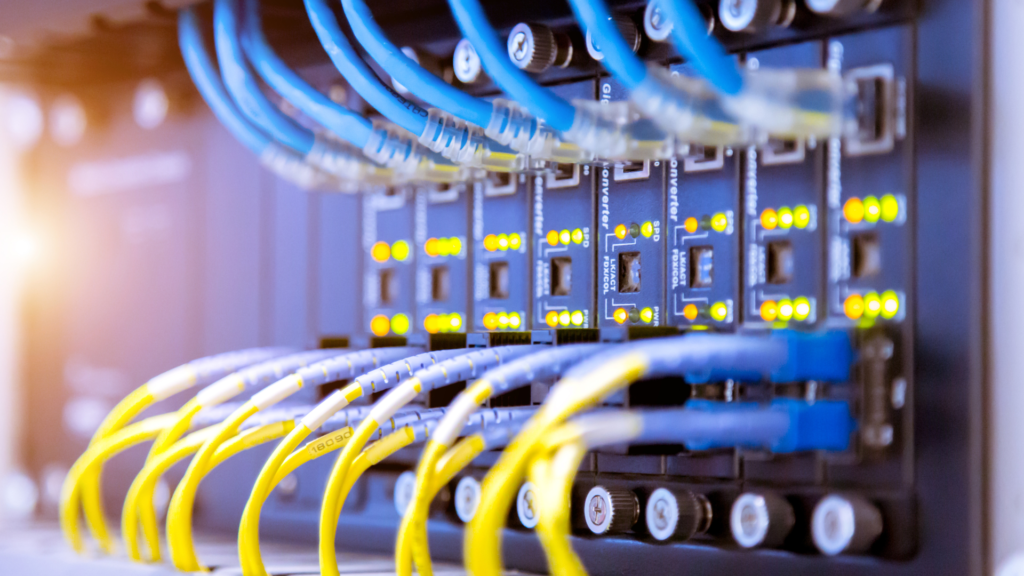
Table of Contents
Carrier Hotels: An Inside Look
In the interconnected world of the 21st century, the invisible networks that keep us connected to the web are often taken for granted. As we send emails, stream movies, and engage in video calls, we seldom pause to ponder the complex infrastructure that makes this possible. At the heart of these networks lie the unsung heroes of our digital age: The carrier hotel.
These are not your typical hotels. There is no concierge or room service here. Instead, they are bustling hubs of data exchange that house the servers, routers, and fiber-optic cables which form the backbone of the internet.
In this blog post, we’ll pull back the curtain on these fascinating facilities, offering an in-depth exploration of their role, functioning, and pivotal role they play in our global communications network. Whether you’re a tech enthusiast or a curious layperson, buckle up for an enlightening journey into the nerve centers of our digital world!
What is a Carrier Hotel?
A carrier hotel, also known as a telecom or carrier-neutral data center, is a physical location allowing different telecommunications and data companies to centralize their operations. These massive buildings serve as an anchor points for high-speed fiber-optic cables and other networking equipment. They act as meeting points for networks. Internet Service Providers (ISPs), telecommunications companies, and content delivery networks can interconnect their hardware directly, bypassing the need for a third-party intermediary.
You’ll find rows of servers, switches, and routing equipment within their walls, all humming away in climate-controlled rooms. These servers store, process, and transfer the data we send and receive over the internet.
The network connectivity provided by carrier hotels is their critical function. These connections, known as peering arrangements, are vital. They allow data to flow from one network to another, connecting users to websites, services, and each other. Carrier hotels enable more efficient data exchange, faster speeds, and greater resilience against network failures by providing a place for these networks to interconnect.
Despite their low profile, carrier hotels are instrumental in the smooth functioning of the internet. They are the backbone of our digital world, ensuring our messages, calls, social media posts, and streaming videos reach their intended destinations quickly and reliably.
How Do Carrier Hotels Work?
Carrier hotels function as centralized hubs where different networks can interconnect directly, leading to more efficient and faster data transfers. Here’s a step-by-step rundown of how these facilities operate:
Housing Infrastructure
Carrier hotels are built to house the physical infrastructure of various internet and telecommunications companies. This includes servers, routers, switches, and high-speed fiber-optic cables that carry data across the internet. Companies rent space in these facilities to install their own equipment.
Interconnecting Networks
Once the physical infrastructure is in place, networks can establish connections. This is done through a process known as “peering.” Peering involves the mutual exchange of data between different networks without a cost. It’s like an agreement between networks to allow data to flow freely, improving the speed and efficiency of data transfer.
Data Transfer
When you send an email, stream a video, or browse a website, the data travels through these interconnected networks. For example, if you’re in New York and want to access a website hosted on a server in London, the data might pass through multiple networks within a carrier hotel to reach its destination.
Scalability and Adaptability
Carrier hotels provide a flexible environment where companies can quickly scale their operations up or down. If a company needs more space, power, or cooling for its servers, it can adjust its setup within the carrier hotel to meet these needs.
Security and Maintenance
Carrier hotels provide 24/7 security and technical support to protect and maintain critical infrastructure. This includes physical security measures like surveillance and access controls, as well as digital security measures like firewalls and DDoS protection. They also ensure the environment is suitable for the equipment, with climate control, fire suppression systems, and backup power supplies.
Redundancy
Redundancy is a crucial feature of carrier hotels. They typically have multiple power sources and internet connections to ensure that others can take over if one fails. This is crucial for maintaining the uninterrupted data flow and running the internet, even during unexpected events or failures.
In essence, carrier hotels are the physical embodiment of the internet’s interconnectivity, facilitating the smooth flow of data across the globe. They are a testament to the complex behind-the-scenes operations that connect us daily.

The Biggest Carrier Hotels in the United States
There are carrier hotels sprawled across different American cities from New York to California. We have outlined five of the most prominent ones below.
| Carrier Hotel | City and State | Major Colocation Service Provider |
| 60 Hudson Street | New York City, New York. | Digital Reality |
| 624 South Grand Avenue | Los Angeles, California. | CoreSite |
| 350 East Cermak Road | Chicago, Illinois. | Equinix |
| 50 NE 9th Street | Miami, Florida. | Equinix |
| 1950 North Stemmons Freeway | Dallas, Texas. | Equinix |
60 Hudson Street
The carrier hotel at 60 Hudson Street in New York City was constructed in 1930 to be a Western Union telegraph office. However, it was renovated in 2013 to meet the demands of new technology. Today, the art deco-style building is 1.1 million square feet large, 24 stories tall, and takes up a whole city block.
Owned and managed by the Stahl Organization, 60 Hudson Street is home to hundreds of telecommunication companies and SaaS providers. The carrier hotel also houses data center operators who lease their spaces to businesses needing colocation services in the Empire State.
624 South Grand Avenue
The 30-story carrier hotel at 624 South Grand Avenue is in Los Angeles’s core. Popularly known as One Wilshire, the carrier hotel is 661,553 square feet large. It was built in 1967 but was refitted in 1992 to house telecommunications and colocation infrastructure.
One Wilshire accommodates more than 300 network service providers and can access several satellite earth stations, making it a vital to Los Angeles’ colocation industry. Almost all the big data centers in the city connect to One Wilshire.
624 South Grand Avenue is also well known in the data center space for its connection to several undersea fiber optic cables. These cables provide connection from America’s West Coast to the Asia-Pacific region.
350 East Cermak Road
The carrier hotel at 350 East Cermak Road is about 1.13 million square feet large and eight stories tall. Sitting in downtown Chicago’s main section, 350 East Cermak Road used to be a popular printing plant before its renovation in 1999 – 2000.
Equinix alone serves almost 200 network service providers at 350 East Cermak Road and leases about 133,500 square feet of data center space. However, Digital Reality, another major colocation service provider, owns the carrier hotel. 350 East Cermak Road’s location in Chicago’s core is one of the main factors that make it a great option for colocation in the Midwest.
NAP of the Americas – 50 NE 9th Street
The carrier hotel at 50 NE 9th Street in Miami is called NAP of the Americas. It is a six-story, 750,000 square-feet building that was built in 2001 for data center purposes.
Located in the heart of Miami, NAP of the Americas is strategically placed to control network traffic between the US and Latin America, and the Caribbean. The area has abundant interconnection infrastructure, such as undersea cable landings and fiber optics loops. This enables the carrier hotel to connect multiple countries effectively.
NAP of the Americas also offers access to exchanges like the Florida Internet Exchange and the Miami Internet Exchange. However, the carrier hotel is most popular for connecting to other parts of the Americas from Miami.
Infomart – 1950 North Stemmons Freeway
Infomart, the carrier hotel at 1950 North Stemmons Freeway in Dallas, is about 1.58 million square feet large and seven stories tall. Infomart was built in 1985 and has undergone several renovations to adapt to modern technology. Equinix owns and manages much of the colocation space at Infomart, providing interconnection to more than 140 network service providers.
Infomart is the busiest Dallas colocation hub, and like NAP of the Americas, it also provides traffic to Latin America. So, it’s an excellent option for businesses looking to expand their reach or already have enterprises in the area.
The Biggest Carrier Hotels in the World
American metropolitan areas have the most carrier hotels globally, but there are notable carrier hotels in many other countries. The table below lists some of the largest international carrier hotels and their addresses.
| Carrier Hotel | Address |
| Telehouse West, London | Coriander Avenue, London E14 2AA, United Kingdom |
| Equinix SG3 | 26A, Ayer Rajah Crescent, Singapore |
| Equinix PA2 | 114 Rue Ambroise Croizat, 93200, Saint-Denis France |
| Global Switch Sydney | 400 Harris Street, Ultimo NSW 2007, Australia |
| Interxion ZUR1 | Sagereitstrasse 35, 8152 Opfikon, Switzerland |
The Telehouse West carrier-neutral data center in London houses tens of internet and cloud service providers. Telehouse also has data centers in Hong Kong, Istanbul, Frankfurt, Paris, Beijing, New York, and Tokyo.
Additionally, Equinix, one of the biggest data center and cloud computing companies, owns large carrier hotels in Europe and Asia. Other big names in the international industry are Interxion, Digital Reality, NTT, and Switch.
Looking for a Data Center Service that Suits Your Business Needs? Brightlio’s Got You!
Are you looking for colocation services in a carrier hotel or other data center? As a telecommunications broker, Brightlio provides colocation options to meet your needs and budget. We partner with a global network of colocation providers and can offer solutions in almost any market.
Additionally, we provide other business technology services, including internet connectivity, cloud, advisory, and unified communications. We are committed to being your most trusted and responsive IT solutions provider.
Contact us today!
Recent Posts
Data Centers In Alabama: Why You Must Colocate
10 Largest Underground Data Centers in the World
100+ VoIP Statistics from Credible Sources (Jan – 2026)
10 Largest Data Centres in the UK
Let's start
a new project together



